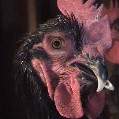 I ran across this article looking for information on avian flu. South Carolina is the capital of the poultry industry, but even there, nobody wants to live next to a commercial chicken house. Thomas Brickle, who owns three egg houses in the area, made one comment I found particularly inspiring:
I ran across this article looking for information on avian flu. South Carolina is the capital of the poultry industry, but even there, nobody wants to live next to a commercial chicken house. Thomas Brickle, who owns three egg houses in the area, made one comment I found particularly inspiring:
“We have flies,” he said. “We had flies before we had chicken houses, and we probably had flies before we had chickens.”
OK, so, what has no fur, struts around on two legs, thinks he is good looking (but isn’t), and likes the sound of his own voice? If you guessed Donald Trump, you get partial credit. I was thinking of a typical rooster. My daughter has three of them: Bumblebee (good), JD (bad), and Slowpoke (ugly with a capital U). Although it’s legal to keep one rooster in Seattle, unless you can convince it not to crow before 8:00 AM, the noise ordinance will nail you. On the other hand, if your neighbors don’t complain (they like being awakened at sunrise everyday) then you’re in like Flint. Assuming the latter scenario was unlikely to pan out, I opted to put them in a soundproof chicken coop. We don’t usually let them out before 10:00 AM, to spare our neighbors as best we can.
If you guessed Donald Trump, you get partial credit. I was thinking of a typical rooster. My daughter has three of them: Bumblebee (good), JD (bad), and Slowpoke (ugly with a capital U). Although it’s legal to keep one rooster in Seattle, unless you can convince it not to crow before 8:00 AM, the noise ordinance will nail you. On the other hand, if your neighbors don’t complain (they like being awakened at sunrise everyday) then you’re in like Flint. Assuming the latter scenario was unlikely to pan out, I opted to put them in a soundproof chicken coop. We don’t usually let them out before 10:00 AM, to spare our neighbors as best we can.
Oddly enough, I find it soothing to watch chickens scratching about in the yard. Why do I get warm fuzzies watching a bunch of chickens? A guess would be that people susceptible to chicken-elicited endorphin releases were somehow imparted a reproductive advantage. Maybe this led them to be better animal keepers, which in turn made their progeny less susceptible to protein deficiencies. Hey, it could happen. The fossilized skulls of some native Americans show signs of severe iron deficiency resulting from eating too much corn.
 For most of their domesticated history, chickens were used as a dietary supplement. They walked about, pecking and scratching, converting worms, caterpillars, spiders, slugs, and anything else they could find into a high protein, iron-rich food source for people. The chicken was used sparingly, in a sauce, or stew, or added in small quantities to rice, grain, starch, or vegetables as is still commonly done today in Asia and Africa.
For most of their domesticated history, chickens were used as a dietary supplement. They walked about, pecking and scratching, converting worms, caterpillars, spiders, slugs, and anything else they could find into a high protein, iron-rich food source for people. The chicken was used sparingly, in a sauce, or stew, or added in small quantities to rice, grain, starch, or vegetables as is still commonly done today in Asia and Africa.
That isn’t how it works anymore in the industrialized West. Our farm animals today are fed food crops inside filthy warehouses. This completely defeats one of the original reasons for having chickens — their ability to create a high quality food source from scratch (literally). The other perversion is that the meat has become the main course.
The verbiage on a package of imitation soy sausage in my freezer tells me that by becoming a vegetarian I am leaving more grain for others to eat. This argument does not hold water for a number of reasons and is therefore not a defensible reason to stop eating meat. A more defensible reason would be that, if enough people did stop, less rainforest would fall and more cropland could be allowed to go back to nature, providing the habitat needed to halt our ongoing extinction event. Which is what environmentalism all boils down to in the end. Clean air, clean water, and safe food on a planet stripped of its biodiversity would be a hollow victory.
I would also suggest that one does not need to stop eating meat. It would be enough to just eat less of it. Using it to supplement a meal instead of making it the meal would also let you pay more for chicken raised outside the mass-production system. This idea can be more appealing than giving meat up altogether and might be a more effective strategy to reduce meat consumption than the all-or-nothing mentality.
 I ran across this
I ran across this 

